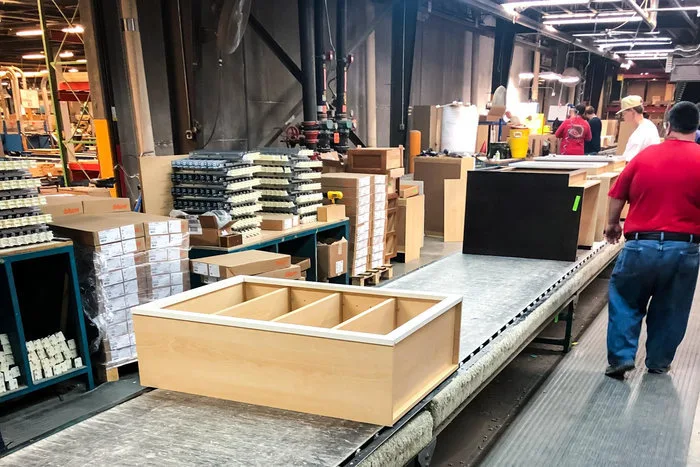By Sylvia Xu
HIGH POINT, N.C.—U.S. kitchen cabinetmakers are sounding a hopeful note for the future of domestic production as new tariffs on cabinets take effect.
“We look forward to rejuvenating this venerable old cabinet industry that we’re so proud of,” Edwin Underwood, president and chief operating officer of Marsh Cabinets, told The Epoch Times. The family-owned business in High Point, North Carolina, has been in operation for almost 120 years.
President Donald Trump’s 25 percent tariffs on imported kitchen cabinets and vanities took effect on Oct. 14. In January 2026, the tariff rate will increase to 50 percent. The new tariffs top existing duties or fees, such as transshipment, antidumping, countervailing, and reciprocal tariffs.
Trump had “the fortitude to poke the bee’s nest,” addressing a challenge that has affected countless industries for decades, Underwood said.
That challenge is posed by imported products that flood the U.S. market at prices that domestic manufacturers cannot afford to match. Marsh Cabinets has been losing business to imported products on a daily basis, according to Underwood.
Like Marsh, Wellborn Cabinet, headquartered in Ashland, Alabama, has been buffeted by the flood of imports. The resulting decline in demand for U.S.-made cabinets forced Wellborn to freeze hiring several years ago. And a large investment in a new factory near Ashland has become a major concern for the company.
The company is now struggling to use the plant and fill its production capacity, Wellborn co-owner Stephen Wellborn told The Epoch Times.
“If this tariff situation doesn’t work, that is going to end up being a very bad investment for us,” he said.
Surging imports of kitchen cabinets grabbed more than $4 billion in market share from U.S. producers in 2022, according to a report from the Coalition for a Prosperous America. The trade deficit in kitchen cabinets alone grew to $3.7 billion in 2024.
While Underwood, Wellborn, and other U.S. cabinet manufacturers are hopeful that new tariffs will level the playing field for the largely family-owned industry, they suggest that even higher tariffs may be needed.
“We need to see the 25 percent stick … and ultimately, to level the playing field, it needs to be more than 50 percent,” Underwood said.
Wellborn said, “We were actually asking for 100 percent, and that would have made a significant difference.”
Unmatchable Prices
For years, the cabinet industry has been unable to compete with foreign imports, which are sold at prices that U.S. manufacturers cannot match, according to Underwood.
“We see products being sold that would be described as directly competitive with ours, anywhere from 25 to 30 percent below ours, and as much as 45 percent below ours,” he said.
Cabinet dealers sell the imported goods not out of preference, but because the significant price difference offers an irresistible financial opportunity, he said.
Wellborn experienced this firsthand as foreign importers began stocking U.S. warehouses with cabinets to ensure quick delivery, then directly targeting the same kitchen and bath dealers his company supplies. The imported products were priced 50 percent to 60 percent lower than similar products from Wellborn.
“There’s absolutely no way we can cut our prices that much, because when somebody is subsidizing and dumping product into an industry, you can’t compete with it,” he said.
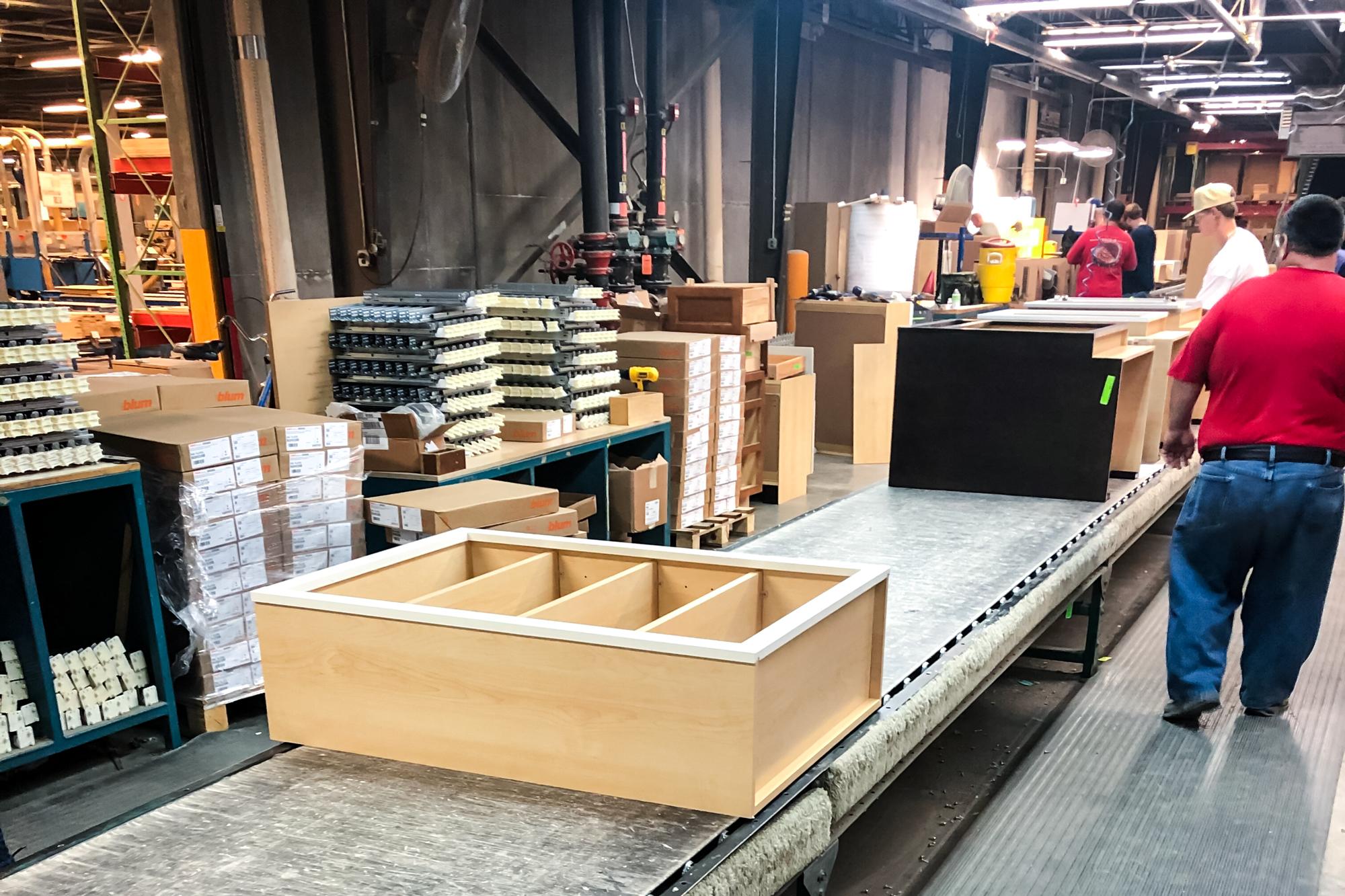
China’s Market Takeover
Take a look at the cabinets lining U.S. kitchens and there is a good chance that you will see “made in China.”
You might also see Malaysia, Indonesia, Cambodia, Thailand, and, increasingly over the past half decade, Vietnam. That does not mean that those cabinets did not originate in China.
China and Southeast Asian nations collectively account for more than half of all U.S. kitchen cabinet imports, according to import data from the International Trade Commission.
Imports of Chinese kitchen cabinets were near zero before 2001. That changed after China became a member of the World Trade Organization (WTO) in 2001.
In 2010, China became the world’s No. 1 exporter of all goods. Total imports from China increased more than threefold from 2001 to 2010 and fivefold by 2018, according to the Census Bureau.
Likewise, imports of Chinese kitchen cabinets to the United States grew exponentially, reaching $1.7 billion by 2018, according to International Trade Commission data.
When China joined the WTO, President George W. Bush granted it permanent normal trade relations status, also known as “most favored nation” status. This fundamentally changed China’s access to international markets.
The most favored nation principle is a core rule of the WTO, stipulating that a trade advantage—such as a lower tariff or a simpler regulation—given to any one member must be extended to all other members immediately.
China had enjoyed most favored nation status since 1980, but that status had to be reviewed and renewed by a vote of Congress each year. Joining the WTO meant that China could enjoy most favored nation status without Congress’s annual examination of its human rights, labor, and environmental record.
Without most favored nation status, imports from China would face much higher tariffs. A 1997 State Department fact sheet states that revoking China’s most favored nation status “would increase tariffs on imports from China from a trade-weighted average of about 6 percent to an estimated 44 percent.”
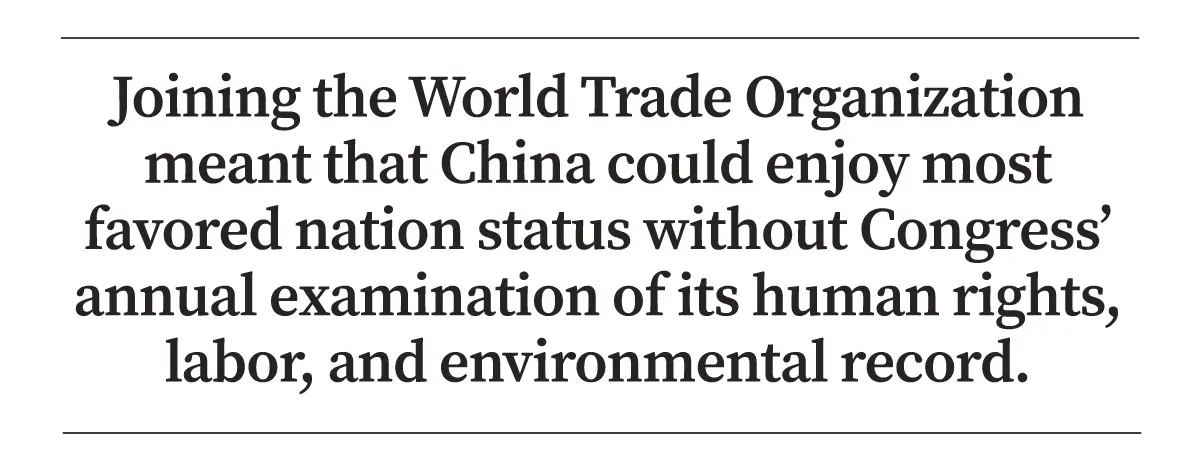
In 2018, the first Trump administration imposed tariffs on Chinese kitchen cabinet imports, starting at 10 percent in September 2018 and increasing to 25 percent in May 2019.
Those tariffs successfully reduced direct Chinese imports by $700 million, according to International Trade Commission data.
Nonetheless, an antidumping duty investigation in 2019 concluded that China’s practice of subsidization and illegal dumping—selling wooden cabinets and vanities below fair value—had injured and distorted the U.S. market.
That dumping had already taken a toll on U.S. manufacturers. Wellborn shrank from 2,000 to 1,200 workers between 2007 and 2020.
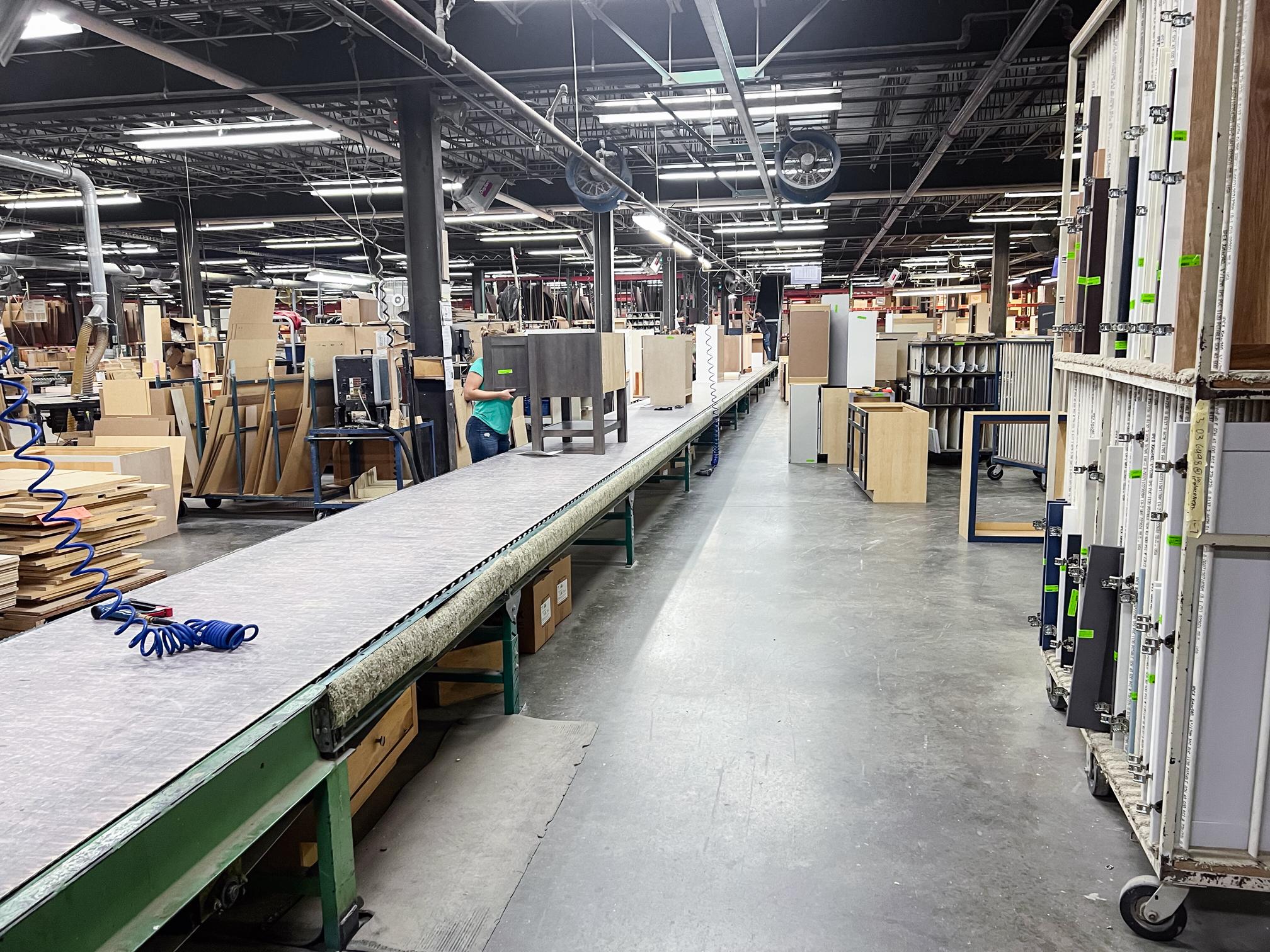
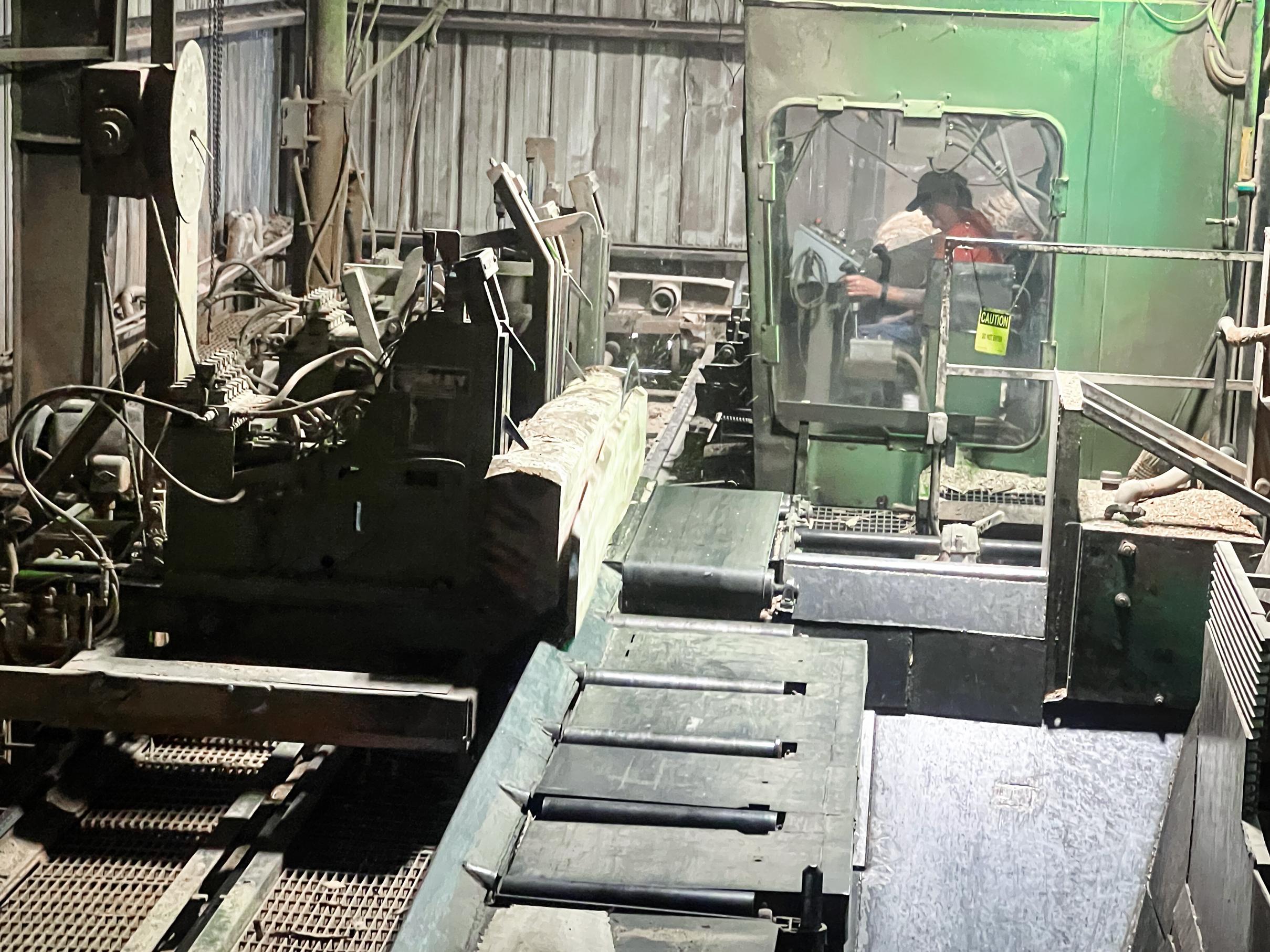
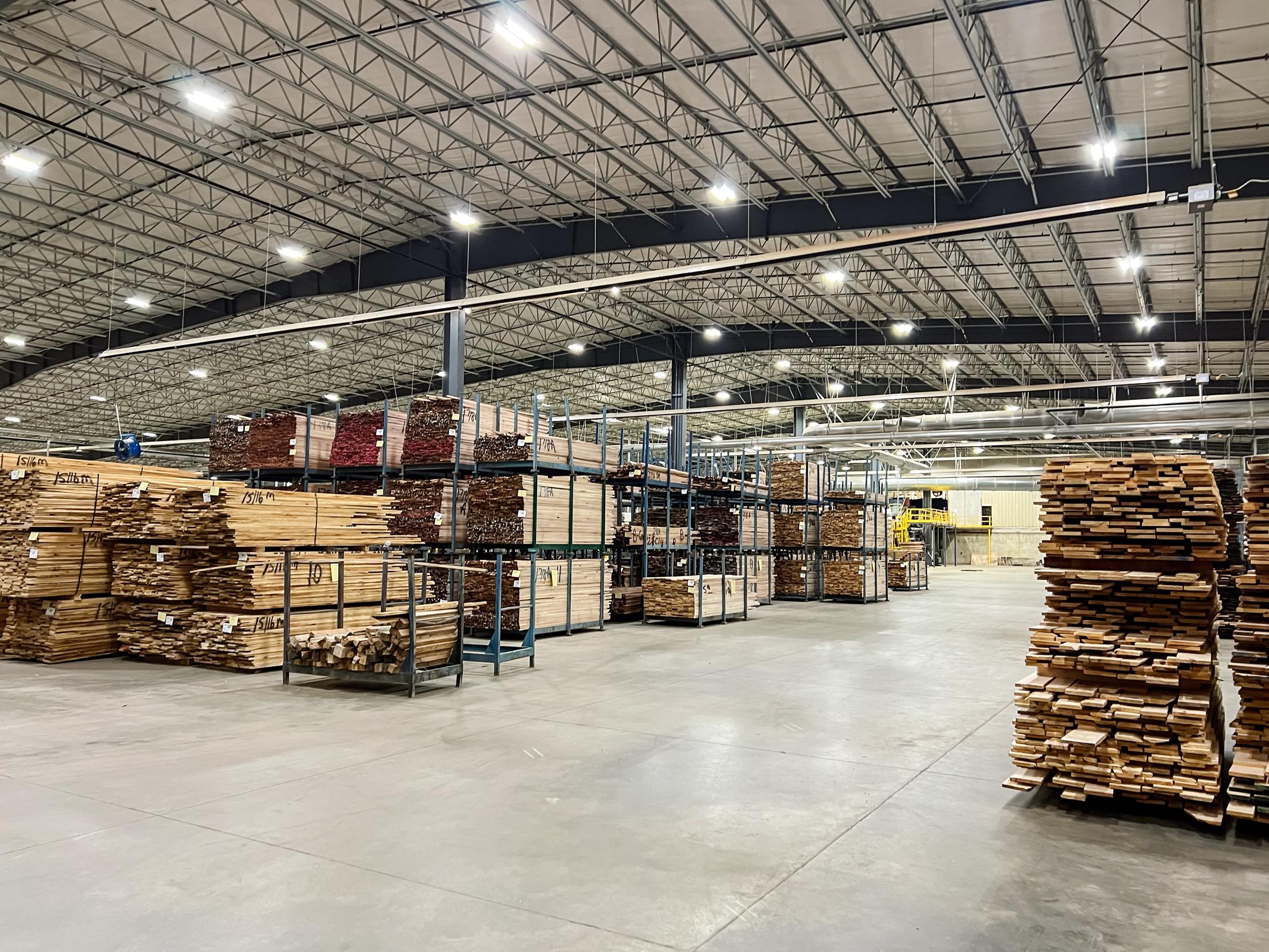
Adapting and Rerouting
In February 2020, the U.S. government imposed antidumping and countervailing duties on Chinese imports, providing U.S. producers with a brief period of relief. The trade remedies led to a brief surge of growth for Wellborn, which began hiring again.
Antidumping duties on China were meant to “rebalance” the playing field. However, this remedy was successfully circumvented by China via transshipment and misclassification schemes, leading to a massive, unsustainable surge of imports from neighboring Asian nations, according to Underwood.
Wellborn said his company has lost 10 percent to 15 percent of its market share since 2022. Other companies, he said, have fared even worse, losing as much as 50 percent.
The surge of growth the cabinetmaker experienced in 2021 and 2022 was short-lived.
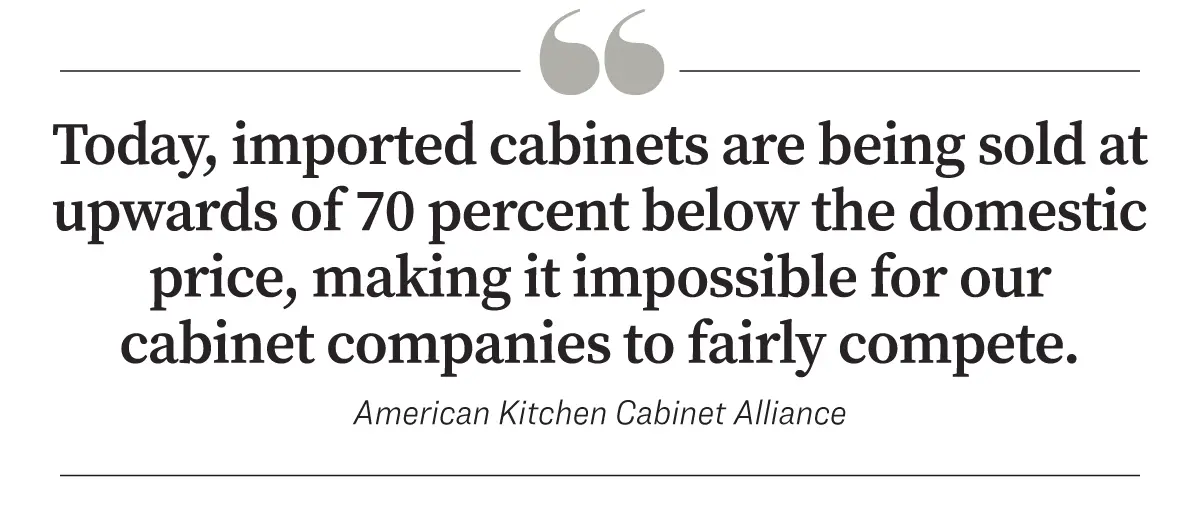
“We were adding people,“ he said. ”We got up to about 1,450 people. We had to drop back now to about 1,300 people.”
The Chinese tactics led to calls for Congress to revoke China’s most favored nation status.
“In the more than two decades since receiving [most favored nation] status and its subsequent ascension to the World Trade Organization, China has routinely violated its trade commitments and international trade law,” Andrew Harding, senior associate for National Security Coalitions at the Heritage Foundation, wrote in a 2023 commentary.
“The United States and China are in a new Cold War,” Harding wrote. “Given that reality, our leaders must take stock of our economic arsenal.”
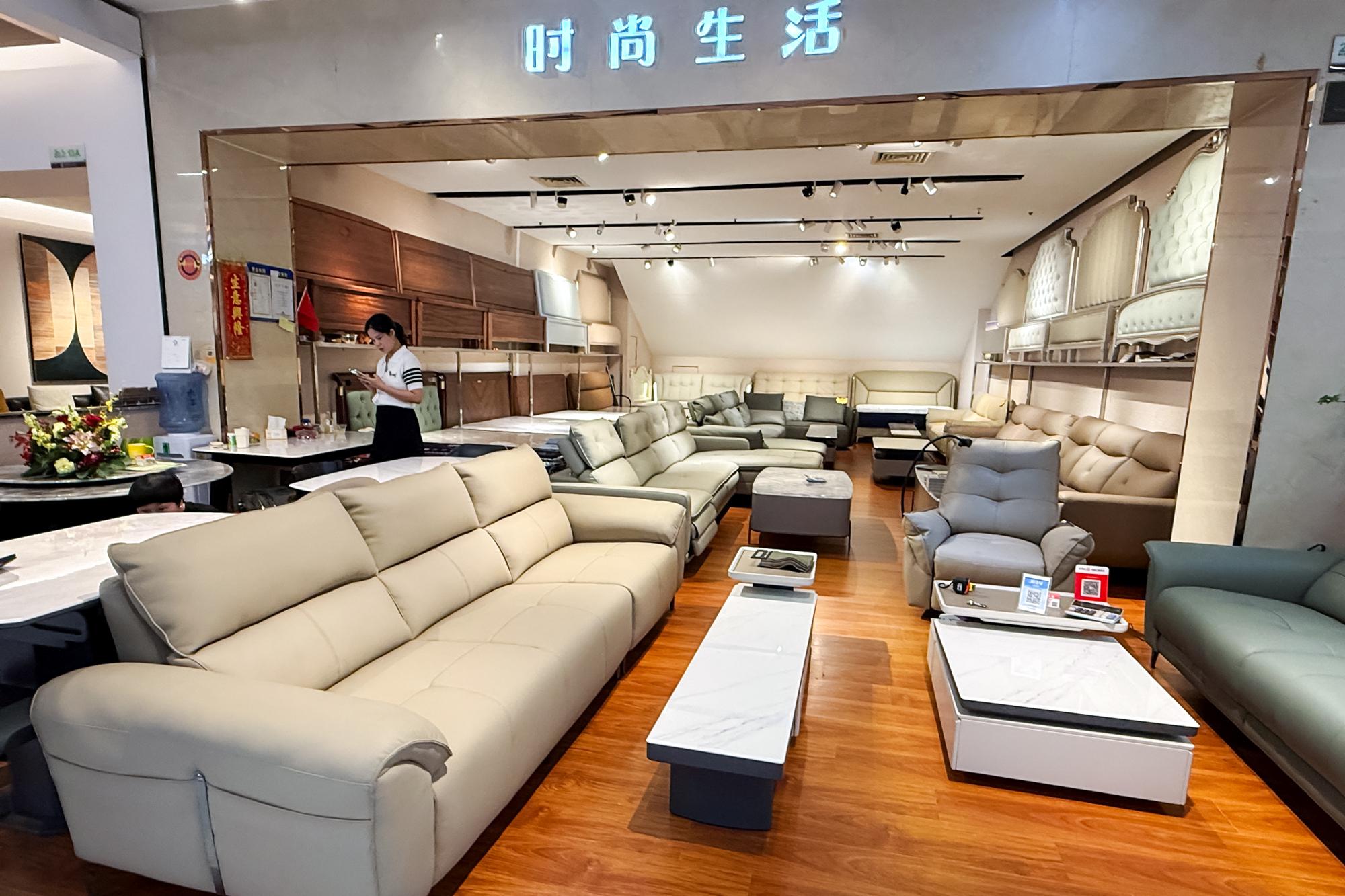
In a Sept. 19 letter, the American Kitchen Cabinet Alliance (AKCA) urged the Trump administration to take action “to save America’s $14 billion cabinet industry and over 250,000 American manufacturing jobs before it’s too late.”
“Today, imported cabinets are being sold at upwards of 70 percent below the domestic price, making it impossible for our cabinet companies to fairly compete,” the AKCA wrote.
On Aug. 7, the Trump administration imposed a transshipment penalty rate of 40 percent on products found to have been illegally rerouted to conceal their country of origin.
More Than a Job
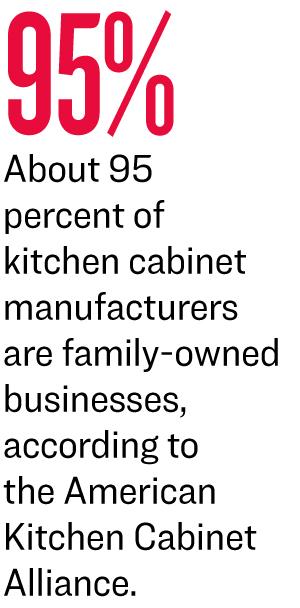
A passion for the art and science of crafting furniture led Ken Kuhn into the wood industry more than two decades ago, after he attended college. He has been at Marsh for 11 years.
The industry has instilled in him core standards such as honesty, willingness to work, and willingness to learn, Kuhn told The Epoch Times.
“If you work hard, if you learn, if you study, then you can get the chance to succeed. … I learned that from a manufacturing life,” he said.
He has passed those traits on to his children, he said, just as his father—who also worked in manufacturing—passed them on to him.
Kuhn is part of an industry that supports more than 250,000 U.S. jobs. About 95 percent of kitchen cabinet manufacturers are family-owned businesses, deeply rooted in small towns across the nation, according to the AKCA.

Underwood said his workers are “not employees … these are families.” More than 160 of his employees have been with the company for more than a decade, he said.
Andrew Rechenberg wrote in a July article in DC Journal, “Unfortunately, these family-run companies are now facing assault from overseas.”
Rechenberg is a senior economist with the Coalition for a Prosperous America.
“The damage has been brutal,” he said, citing seven major cabinet manufacturers who have had mass layoffs or shut down U.S. plants.
In the United States, the kitchen cabinet and countertop manufacturing sector shed 68,600 jobs between 2005 and 2024, according to the Bureau of Labor Statistics.
Kountry Wood, a family-owned company and formerly the second-largest employer in Nappanee, Indiana, which has a population of 6,902, has been forced to reduce its workforce from almost 600 employees in 2022 to a little more than 300 today. It is currently operating at 40 percent capacity.
The massive job loss has severely affected the Amish community surrounding the facility, Kountry Wood President Perry Miller said.
“The Amish community depends on us tremendously, you know, for employment, for the community,” he told The Epoch Times.
A Critical Juncture
Despite new tariffs intended to level the playing field, Underwood said he remains concerned about the extent to which foreign companies are manipulating prices to undercut the domestic industry.
“Dumping tactics are clearly an adaptive strategy by the Chinese Communist Party to these fair trade remedies, which has become an existential threat to the cabinet industry,” Underwood said.
Foreign companies are dumping products in a bid to wipe out the U.S. domestic industry, he said. It is a strategy that has proven successful in the furniture and textile sectors.
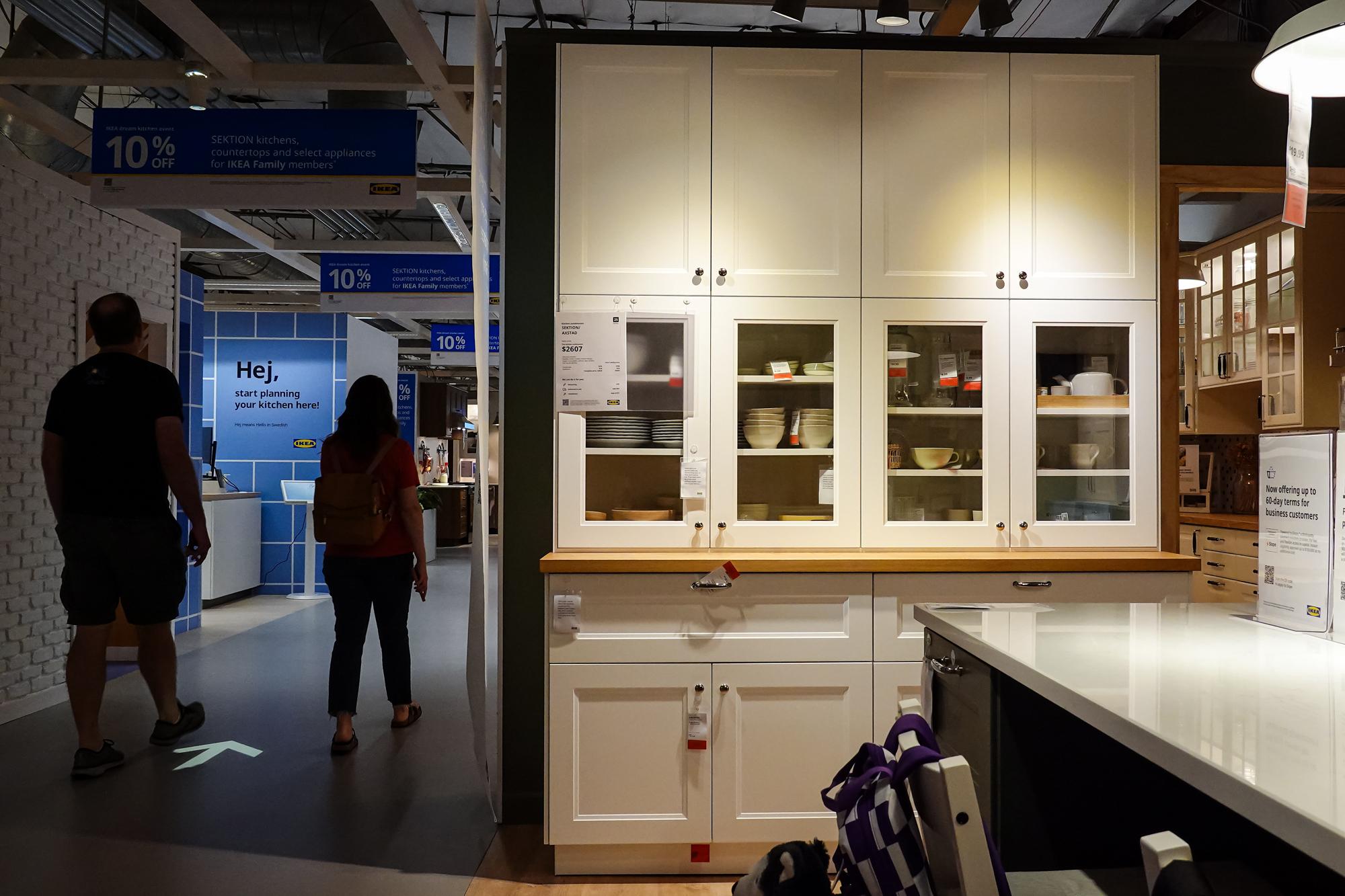
“The imported products come from people who want to see us off the table,” he said. If they are able to secure a monopoly over the market, foreign companies “will normalize pricing, because this is not sustainable for them either,” Underwood said.
Failing to correct the current trade imbalance risks creating future geopolitical vulnerabilities, he cautioned. In a conflict, supplier countries could withhold core resources needed by the United States.
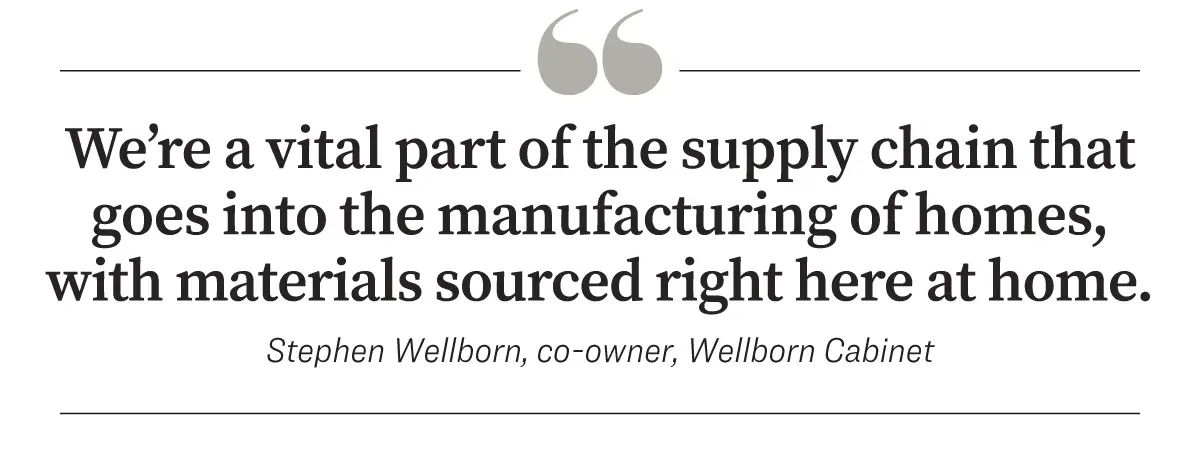
However, the cabinet industry is still a “viable, strong industry” with “huge investments, modern plants, and a large workforce,” Wellborn said.
“We’re a vital part of the supply chain that goes into the manufacturing of homes, with materials sourced right here at home,” he said.
Time will tell whether the current tariffs will be enough to level the playing field.
“We believe we have got the pieces of the puzzle in place to respond assertively, effectively, and in a timely way, to the recovery we hope to see,” Underwood said.
Rechenberg said: “This isn’t just about saving one industry. It’s about whether the United States is still capable of defending domestic manufacturers and their workers.”

